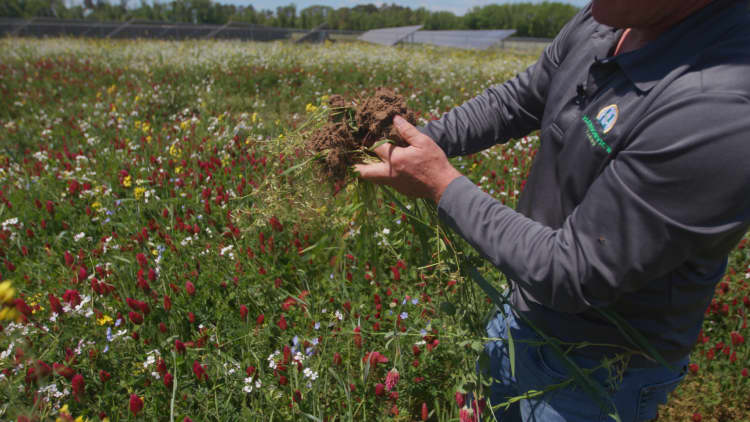
How capturing CO2 has become a new business for farmers
On Trey Hill's farm in Maryland, the fields look a lot different than the clean, orderly rows of crops that his friend is growing. Unlike his friend, who tills his fields after fall harvest and leaves them barren for the winter, Hill plants rye, turnips, clover and a few other species of plants in the off season, so that his fields stay covered year-round.
Known as 'cover cropping,' this practice is just one piece of a movement called regenerative farming. The approach focuses on replenishing the soil's nutrients and also includes things like no-till cultivation, rotational cattle grazing and using less synthetic fertilizers.
As the cover crops grow, and eventually decompose, they provide nutrients for microbes and improve the soil's health. At the same time, the plants pull CO2 out of the atmosphere and store it in the soil.
"Globally, about 25% of our climate change pollution is caused by food and agriculture. Most of that's because we're deforesting places like the Amazon to create more farmland. But also the methane that comes out of our cattle and rice fields is also contributing to climate change, as is the overuse of fertilizers and other things, " says Jonathan Foley, executive director at Project Drawdown. "But regenerative agriculture seeks to reverse that, and not only kind of cut down the pollution, but maybe in some cases, even soak up some of the pollution, we put in the atmosphere, particularly carbon dioxide."
Driven by climate-conscious consumers, a number of massive corporations including General Mills and PepsiCo are vowing to scale regenerative practices across millions of acres of farmland.
The Biden administration has also earmarked $30 billion to help pay farmers to implement sustainable practices and capture carbon in their soil. Part of these funds would be used to create a federal carbon bank, which would stabilize the price of carbon.
But a number of challenges remain including how to accurately measure how much CO2 is locked in the soil and how to convince farmers to adopt regenerative practices in the first place.
Watch the video above to find out more.









